Emergency Dentist Athens
Urgent Dental Care for Your Family
Whether it’s a child, an adult, or a senior, there’s always a chance someone will suffer an urgent oral issue. That’s why Dr. Hill Lindsey and our dental team stay prepared and offer emergency dentistry in Athens to our patients. By doing so, we’re always ready to give you much-needed pain relief and repair your grin. Learn more by reading below or by booking a same-day visit!
Why Choose Athens Dental Associates for Emergency Dentistry?
- Same-Day Emergency Appointments Available
- Sedation Dentistry for Comfort
- Attentive & Skilled Dental Team
How We Treat Dental Emergencies

Maybe you’re dealing with a dental emergency for the first time. If so, you don’t need to worry or panic. Our dental team will gladly walk you through the treatment process. So, expect these four things from an emergency dental visit:
- A Same-Day Visit – When you call, we’ll book you for the earliest possible visit. (You’ll likely see us the same day!) Our staff can also give you first-aid tips over the phone.
- An Emergency Exam – Dr. Hill Lindsey will conduct an emergency oral exam as the visit begins. This step lets her learn the extent and source of your problem. (It also confirms how we can relieve your pain.)
- A Review of Findings – Following the exam, Dr. Hill Lindsey will share her findings with you. She’ll then suggest suitable procedures and draft a treatment plan.
- Needed Dental Care – Our office will solve your oral issue according to your treatment plan. We’ll be ready no matter what, whether you need a filling, crown, root canal treatment, or something else.
The Most Common Dental Emergencies
It’s always best to visit us when these typical (yet urgent) oral issues occur. Our dental team is trained and equipped to handle such problems. In particular, give us a call if you suffer any of the following (click the icons to learn more about how we can help with each problem):
Understanding the Cost of Emergency Dentistry
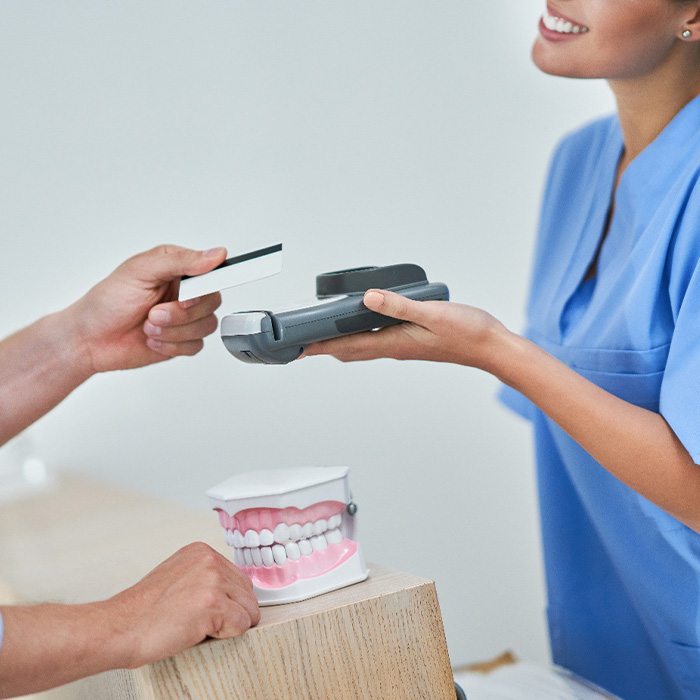
Many people avoid scheduling an emergency dental appointment because they are concerned about one thing—the bill. This is perfectly understandable, but the truth is that putting off treating a dental issue will always result in it costing more. In other words, getting in touch with us when you first notice that something is wrong will benefit your smile and your wallet! Rest assured, we will go the extra mile to make navigating the financial side of your treatment easy too. To start, we’ve provided some helpful information about the cost of emergency dentistry below.
Every Dental Emergency is Different – Here’s Why

If you’re wondering why there isn’t a flat fee for emergency dental care, it’s because there are several different factors that need to be considered, including the type of dental injury, how severe the damage is, and which restorative treatment is needed to restore your healthy, pain-free smile. With all of that said, you don’t have to worry – we will provide you with an estimate of the cost at your visit. We will also review the financial solutions available to prevent the financial side of your treatment from causing you stress.
Does Dental Insurance Cover Dental Emergencies?
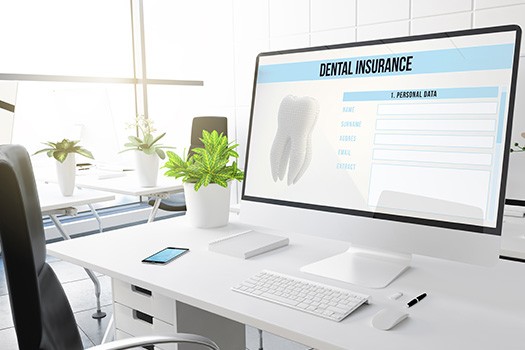
Dental insurance plans often include a free emergency exam, and they usually cover between 50% and 80% of the cost of essential restorative care. Of course, waiting periods, annual deductibles, and other red tape need to be considered in the process. If you’re having trouble understanding what is and isn’t covered, don’t hesitate to let us know! We’d be happy to take a look at your plan, provide you with an estimate of your out-of-pocket expenses, and file the claims for you.
Other Options for Making Dental Emergencies Affordable
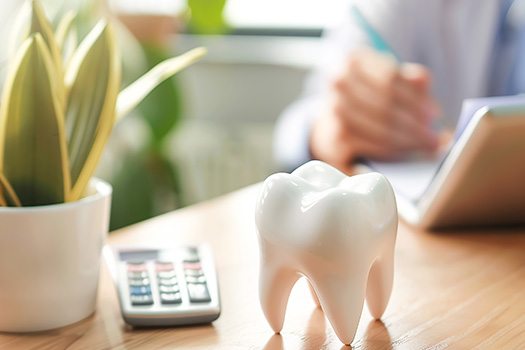
If you are uninsured, ask us about the other financial solutions available! At our Athens office, patients can take advantage of:
- CareCredit Flexible Financing – With CareCredit, you don’t have to pay for the entire cost of your emergency dental care at once. Instead, you can choose one of their convenient payment plans and space out the price into smaller, budget-friendly chunks.
- Our Smart Savings Membership Club – When you enroll in our in-house plan, you enjoy numerous perks, including a 15% discount on all procedures completed at our office. Plus, there isn’t any red tape to work around, like annual maximums and waiting periods.
- Special Offers – Throughout the year, we offer specials, like a free initial exam. That way, they can save while getting the top-tier dental care they deserve. If you are interested in learning about our latest offers, give us a call!
Taking Care Of Your Smile Can Save You Money

Dental problems only get worse over time, meaning they require more extensive (i.e. expensive) procedures to treat. That’s why being proactive and taking advantage of our flexible emergency appointments is highly recommended for your health, comfort, and wallet. Don’t hesitate to reach out when you first notice that something is wrong too – whether it’s pain when biting down or gums that bleed when you floss.
It’s also important that we mention here just how crucial committing to good oral hygiene habits at home is. After all, brushing, flossing, and rinsing with mouthwash consistently can dramatically reduce your chances of needing emergency dental care. So, if you haven’t already, incorporate these best practices into your daily routine.
Keys to Preventing Dental Emergencies
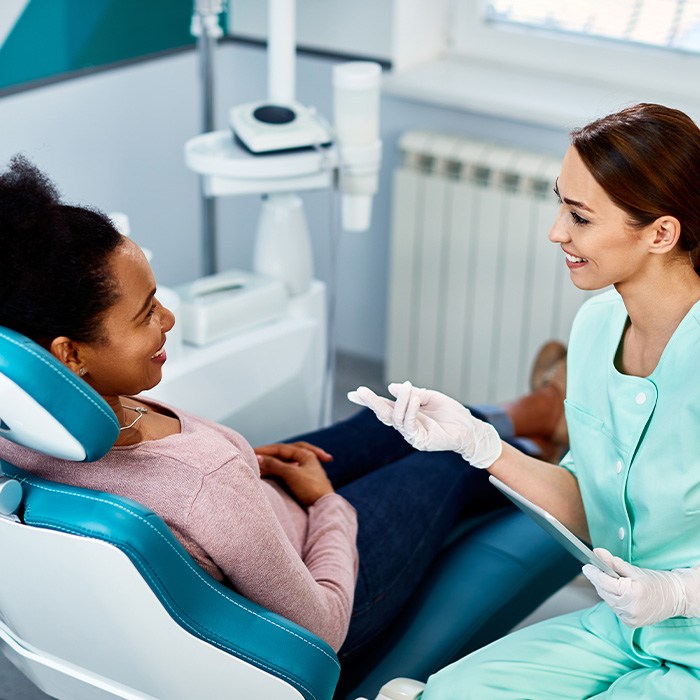
Rest assured, our team at Athens Dental Associates is here to help when you need us – whether it’s because your gums are bleeding when you floss or you completely knocked out a tooth. That said, we want to help you avoid common dental injuries like these as well. That’s why we’re sharing some habits we recommend adopting to keep your smile happy and healthy. Read on to learn what they are!
Visit Your Dentist Every Six Months

The first habit we recommend adopting is coming to our Athens dental office every six months for a dental checkup and teeth cleaning. This is crucial because tooth decay, gum disease, and other common oral health problems can develop and progress without any symptoms at all. So, to catch and treat them quickly, we need to take X-rays and conduct an oral exam periodically. The cleaning portion of your visit is also crucial because it allows us to remove harmful substances, like plaque.
Maintain Good Oral Hygiene At Home

Maintaining a solid oral hygiene regimen at home is important for numerous reasons – from keeping your breath fresh to preventing plaque buildup. The key is incorporating the right steps, with the right tools, and for the right amount of time. For example, you should use a soft-bristled toothbrush and fluoridated toothpaste to brush your teeth for two full minutes each morning and evening. Similarly, you should use an ADA-approved mouthwash for 30-60 seconds each day.
Avoid Extremely Crunchy Foods

Unfortunately, extremely crunchy foods can cause your enamel to chip or crack. So, it’s best to avoid candy canes, lollipops, hard pretzels, peanut brittle, and the like. Instead, incorporate foods into your diet that are nutrient-dense, softer in consistency, and delicious. A few examples include oatmeal, plain yogurt, and bananas. This will dramatically reduce the chance of dental damage while also keeping your teeth and gums healthy from the inside out.
Wear a Mouthguard During Sports
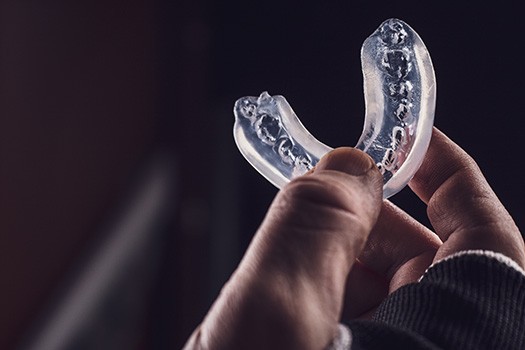
Whether you play football, you like rollerblading, or you enjoy lifting weights, you should have a custom mouthguard made. That way, your teeth are protected from things like unforeseen impact, a bad fall, or chronic clenching.
Speaking of chronic clenching… you should visit us if you clench or grind your teeth at night. That way, we can take impressions of your mouth and use those to create a custom nightguard.
Don’t Use Your Teeth as Tools
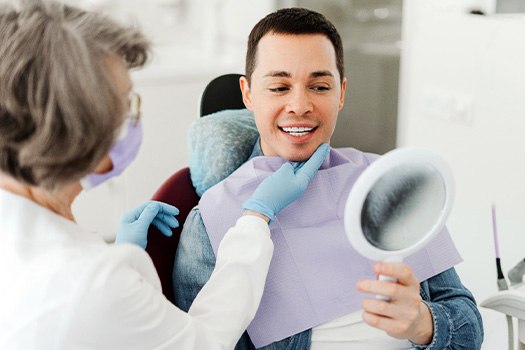
Although your teeth are strong, they aren’t meant to be used as tools. So, don’t use them to open bottle caps, remove plastic wrapping, bite your nails, or chew on ice cubes. We also recommend avoiding tobacco products, not chewing gum that is loaded with added sugar, and steering clear of anything else that has the potential to negatively impact your smile.
I Need a Checkup & Cleaning I am Worried About Gum Disease I Have a Cavity or Broken Tooth I am Missing One or More Teeth I Want to Enhance My Smile I Want a Straighter Smile I Have Jaw Pain I'm Having Trouble Sleeping I am Scared of the Dentist View Our Services

